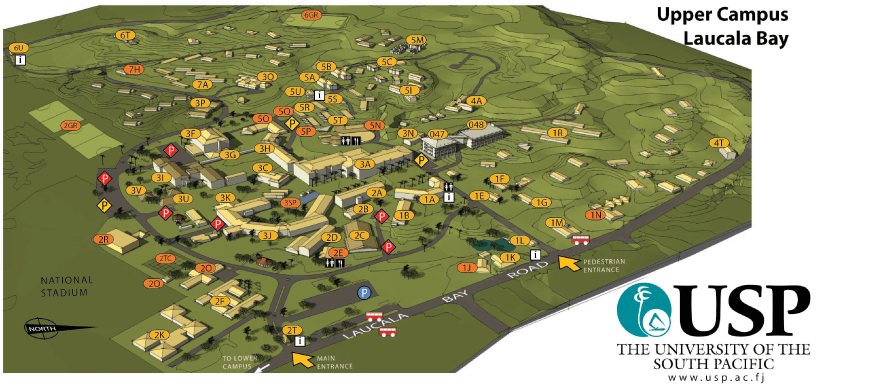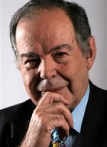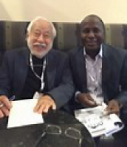The First Interdisciplinary, International Conference on Thinking, 1982, a Summary

The University of the South Pacific, Suva, Fiji
In 1979, the School of Education at The University of the South Pacific voted to approve Professor William Maxwell’s proposal to host the International, Inter-disciplinary Conference on Thinking. (In 1979, not one Pacific Islander within the School of Education, which included mathematics, English, Home Economics, Industrial Arts, Music, Psychology and Education, and on the entire campus held a doctoral or research degree.) The Conference was designed for several purposes, including inspiring local faculty members to do research and to study for a research-based doctoral degree.
The Vice-Chancellor, Dr. James Maraj, immediately approved and allocated $2,000 to promote the Conference. Immediately, Professor Maxwell telephoned the world’s foremost authority on the deliberate teaching of thinking skills and the author of over 50 books on Thinking, Dr. Edward de Bono, MD, D.Phil., Ph.D., of Malta and England, and with doctoral degrees from the Universities of Malta, Oxford, and Cambridge. Within 90 seconds, Dr. de Bono excitedly agreed to come at his own expense and to cover his own hotel and meal costs.

With that success, Professor Maxwell then telephoned the British Council, an agency of the British Government that supported higher education throughout the British Commonwealth. Again, the Director responded immediately, “Professor Maxwell, you are in luck. I looked at my budget yesterday and can afford to send three professors concerned with thinking, who do you want?”
With that success, Professor Maxwell, telephoned the British Council, an agency of the British Government that supported higher education throughout the British Commonwealth. Again, the Director responded immediately, “Professor Maxwell, you are in luck. I looked at my budget yesterday and can afford to send three professors concerned with thinking, who do you want?”
“Richard Dawkins, the author of The Selfish Gene, is the only high-level thinker in Britain whose work I know well. Can you identify two more?”
“Yes. How about Donald MacKay, a physicist formerly at the University of London who heads Britain’s first Brain Science Research Center at Keele University, and Margaret Boden, Dean of Psychology and Philosophy at Sussex University. She studied under Jerome Bruner at Harvard and is Britain’s number authority on artificial intelligence?”
“Yes, of course.”
The next day the Director telephoned back to announce that all three were coming with the British Council covering their expenses. A brilliant 12” x 18” full-color poster featuring a blue lagoon and palm trees was sent to every major university around the world. The poster and those four British scholars were magnets that attracted a total of 250 scholars from 41 universities in 14 nations.
The Conference proceedings were published by The Franklin Institute Press, Thinking: The Expanding Frontier, (William Maxwell, Ed.), Philadelphia, 1983. From the Introduction:
“The primary goal of the Conference was to help accelerate the clearly evident trend toward giving more emphasis to teaching thinking skills“, which, unlike many other skills, never go out of date.
The three-day conference inspired the premier cognitive psychologist in the world, Jerome Bruner of Harvard, to write an encomium to the event in the Preface: “It is an interesting twist of history that a gifted group of scholars should gather . . . in Suva, Fiji, to discuss the nature of human thought . . . The Fiji Conference was indeed about the nature of mind . . . I was not there, alas, and now that I read these pages am full of regrets.”
Almost every attendee declared this to be “The best Conference I’ve ever attended.” The attendees voted unanimously to continue meeting every 2 ½ years, alternating hemispheres. The second was at Harvard, the third at Hawaii, the sixth at MIT, the eighth at Edmonton, Alberta, Canada, the Ninth at Auckland, the tenth at Harrogate, England, etc. Eighteen ICOTs have grown from 250 to over 3,000 in Singapore, Melbourne, and Stockholm. A much smaller-sized consultative ICOT XIX will be held in Arkansas in December 2021.
Four Highlights of the First International Conference on Thinking:
* ICOT I was the first academic conference to discuss Professor Edward de Bono’s breakthrough curriculum to improve the thinking skills of students, adults, and institutions, CoRT. The proceedings of the Conference, William Maxwell (Ed.) Thinking: The Expanding Frontier. Philadelphia: Franklin Institute Press, 1983, included three papers on the de Bono Method. (Thinking is now out of print, but used copies are available at Amazon.com.)
* An interdisciplinary symposium of Gregory Bateson’s Mind and Nature: A Necessary Unity, organized by Professor Victor Kobayashi of the University of Hawaii, illustrated that the causes of social maladies are multiple and require a multiple inquiry approach to be solved.
* Parents and educators were reminded by research conducted at the University of the South Pacific by Professor William Maxwell that babies begin inventing games shortly after birth as exemplified by “Peek- a-boo” which most babies invent a few hours or days after birth without ever having seen the game. Adults with high IQ’s invariably will have been introduced to dozens of intellectually stimulating fun games at each stage of development. For example, intelligent fathers will play the game of “toesies” with their baby around six months after birth, gently pulling and counting the toes out loud, delighting their baby almost to the point of hysteria sometimes. Both intelligent parents and the intelligent child continue almost weekly to invent new games with the baby being ready for logical and abstract reasoning games at around 3 ½ years. Professor Maxwell’s paper went on to invent a classification system for ancient games that have a powerful IQ effect. That breakthrough classification system which indicates when the child is ready for which, and which parts of the brain each game exercises has been ignored by developmental psychologists and educators up until now. An earlier version of that paper, “Games children play: How they increase the intellect?” was published in the British Journal of Educational Development 1(3):29–48 · January 1982.
* In an ancient academic tradition the Conference Keynote Address was opened to the general public without charge. Both daily newspapers in Suva carried full-page stories of the Conference. There was not an empty seat in the university’s largest auditorium as Professor Edward de Bono held spell-bound the audience as he illustrated the most modern methods of problem-solving with slides and his polished Oxford/Cambridge accent.
Some key presentations:
- Three discussions/papers on Edward de Bono’s CoRT Thinking program
- William Maxwell’s report of how playing games with symbols increase the IQs of six-year-old children in Suva, Fiji, by an average of 19 points.
- Victor Kobayashi’s Symposium on Gregory Bateson’s theories on thinking embedded in his “Mind and Nature: A Necessary Unity”
- Don MacKay’s report on the Human Brain as an ever-changing wired “Electrical Board.”
- Professor de Bono’s Public lecture, which was open to the entire city, and every seat was filled in the largest auditorium on the campus.
The world’s foremost cognitive psychologist wrote, “The Fiji Conference was indeed about the nature of mind. That, in any case, was its starting point, wherever else it went. And it traveled far. I was not there, alas, and now that I read these pages, I am full of regrets.” --- Jerome Bruner in the
Preface, Thinking: The Expanding Frontier, William Maxwell, Editor, 1983.



